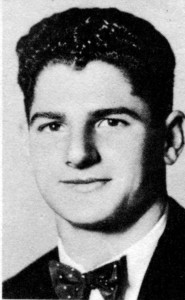Paul Henry Durckel ’36

A native of Oakland, Paul Durckel was very active at Tech singing in boys’ glee and playing football and basketball, as well as participating in track and “tumbling” (gymnastics). From Tech, Durckel went on to Stanford University where he graduated in 1940.
Starting in March 1943, he served in the Army Air Corps, advancing to the rank of lieutenant and serving as a navigator with the 781st Airborne Squadron flying strategic combat missions over Italy and Austria. During his 24th mission in March 1945, Durckel in the nose of the B-24 Liberator when it sustained heavy enemy fire and went down. Reaching for his parachute and finding it gone, Durckel crawled through the burning and fast-dropping plane to find the last parachute, only to discover that it had been damaged by fire. Miraculously, the parachute functioned and after diving from the plane, Durckel and the surviving members were captured by local villagers who immediately hanged several of the airmen. A pair of German soldiers on patrol arrived on the scene, and ironically, prevented the villagers from hanging Durckel. He was taken into custody and delivered to a train bound for Stalag Luft III, a work camp in the German province of Lower Silesia.
He was later transferred to a camp closer to the Swiss border, where General George S. Patton and his troops liberated him and his fellow prisoners of war. He was awarded the European-African-Middle Eastern Campaign (E.A.M.E.) medal with five Bronze Stars as well as four other medals and was nominated for a Distinguished Flying Cross Award. Post-war he was promoted to the rank of captain. He married in 1946, moved to Texas, and bought a farm where he raised four children.
He died at age 96 in 2013.
